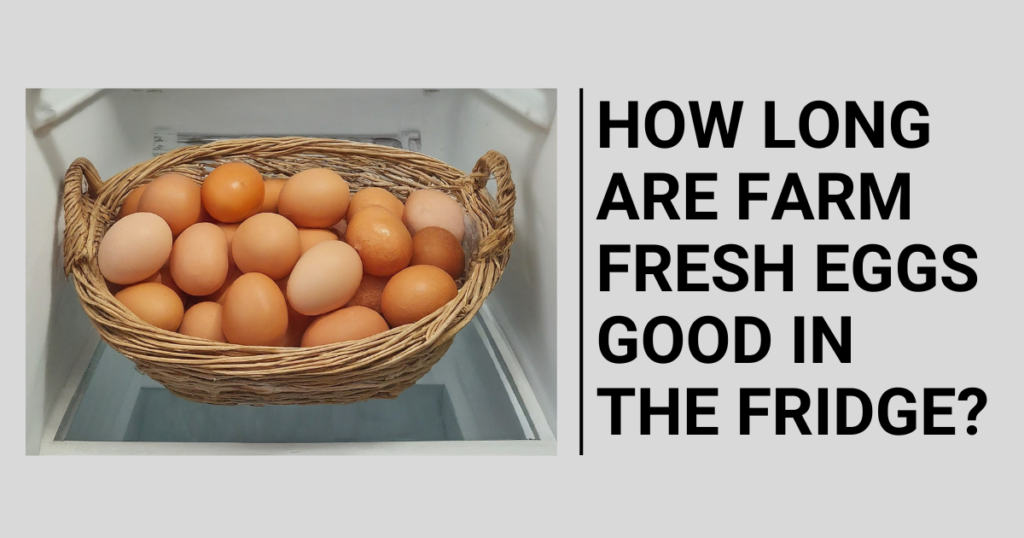Farm fresh eggs can last up to three months in the fridge if stored correctly. This extended shelf life ensures you have a steady supply of nutritious eggs. Knowing how long are farm fresh eggs good in the fridge ensures you have a steady supply of nutritious eggs. Here’s a detailed look at how to maximize their freshness and quality.
How Long Do Farm Fresh Eggs Last in the Fridge?
A general guideline is that farm fresh eggs can stay fresh in the refrigerator for up to three months. However, this timeframe can vary based on the aforementioned factors.
Comparison Table: Freshness Duration

| Storage Condition | Duration |
| Unwashed, room temperature | Up to 2 weeks |
| Unwashed, refrigerated | Up to 2 months |
| Unwashed, refrigerated(under optimal conditions) | Up to 3 months |
| Washed, refrigerated | 3 to 5 weeks |
| Washed, refrigerated(under optimal conditions) | Up to 2 months |
| Eggs stored above 40°F | Reduced shelf life |
| Cracked or dirty eggs | Immediate consumption |
Optimal conditions- such as maintaining a constant refrigerator temperature and avoiding temperature fluctuations.
Proper Storage of Farm Fresh Eggs
Cleaning and Preparation
Farm fresh eggs often come with a natural coating called the bloom. This coating helps protect the eggs from bacteria. If you wash the eggs, they must be refrigerated immediately to prevent contamination.
Ideal Temperature
Keeping eggs at a consistent temperature is key. The fridge should be set between 35°F and 40°F (1.7°C to 4.4°C). This range maintains the eggs’ quality and prevents spoilage.
Factors Affecting Freshness
Eggshell Integrity
Cracks in the shell can shorten the eggs’ lifespan. Always handle eggs gently to prevent damage.
Storage Position
Store eggs with the pointed end down. This keeps the yolk centered and maintains freshness longer.
Container Choice
Use egg cartons to store eggs. This reduces moisture loss and odor absorption from other foods in the fridge.
Washing
Unwashed eggs possess a protective cuticle that repels bacteria. Washing removes this layer, necessitating refrigeration for extended shelf life.
To know more about the washing of farm fresh eggs check the article linked below:
Signs of Spoilage
Visual and Smell Test
A fresh egg will have a clear, thick egg white and a firm yolk. Spoiled eggs emit a foul odor and should be discarded immediately.
Float Test
Place an egg in a bowl of water. Fresh eggs sink, while older eggs float due to air cell expansion.
Maximizing Freshness
Regular Checks
Periodically inspect eggs for cracks and cleanliness. Remove any damaged eggs to prevent contamination.
Use-by Date
Mark the collection date on the egg carton. Use the oldest eggs first to maintain a fresh supply.
How Long Do Farm Fresh Eggs Last Unrefrigerated?
Farm fresh eggs can last up to two weeks when stored at room temperature. The natural bloom coating on unwashed eggs protects them from bacteria. However, once washed, the eggs must be refrigerated immediately to ensure safety and longevity. Storing them in a cool, dry place away from direct sunlight can help maintain their freshness during this period.
To know more about How Long Do Farm Fresh Eggs Last Unrefrigerated check the article linked below:
How Long Do Farm Fresh Eggs Last Unrefrigerated?
Tips for Storing Farm Fresh Eggs
To maximize egg freshness, adhere to these storage practices:
- Refrigerate promptly: Refrigerate eggs immediately after buying them.
- Store in original carton: The carton helps maintain egg stability and protects against odors.
- Avoid washing: If possible, refrain from washing eggs until ready to use.
- Check for freshness: Utilize the float test to determine egg freshness. In a bowl of water, a fresh egg will submerge.
By following these guidelines, you can keep farm fresh eggs good in the fridge for up to three months. Proper storage, regular checks, and understanding spoilage signs are key to enjoying fresh eggs for longer.
Note: For more detailed information on egg safety, consult the following resources:
Disclaimer: The information presented here is for general knowledge and educational purposes only.This information is not intended as professional guidance. Always consult with a food safety expert for specific guidance.



